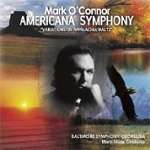|
Back
02/26/2009
Mark O’Connor: Americana Symphony: “Variations on Appalachia Waltz” (*) – Concerto No. 6 “Old Brass” (for violin and orchestra) (**)
Baltimore Symphony Orchestra, Marin Alsop (conductor) (*), Mark O’Connor (violin), Pro Arte Chamber Orchestra of Boston, Joel Smirnoff (conductor) (**)
Recorded in Meyerhoff Orchestra Hall, Baltimore, Maryland (September 10, 2008) (*) and in Sanders Theatre at Harvard, Cambridge, Massachusetts (September 22, 2008) (**) – 67’39
OMAC/Mark O’Connor Musik International, 2009 Reference # OMAC-12 – English language booklet

Full disclosure: I am a Southern-born person, with deep ancestral roots in the Appalachian Mountains, who grew up to write for some rather venerated classical music entities. It’s an interesting and intermittently frustrating history, as one consequently deals with a myriad of uninformed questions from those who cannot fathom an intelligently artistic soul who possess such an etiology. Inevitably then, the work of composer/violinist Mark O’Connor - who is notably the only internationally celebrated classical violinist who is non-classically trained, who has also developed a instrumental method purely derived from the American folk violin tradition, and whose many recordings include such intriguing titles as Folk Mass, Soppin’the Gravy, and The New Nashville Cats - is immediately appealing. As Mr. O’Connor’s career trajectory prodigiously demonstrates, a gifted individual may acquire polished musicianship through hard work and study – but musicality itself is an inborn thing.
O’Connor is of course quite well known for a number of high-profile, commercially viable ventures - the closing ceremony interlude for the 1996 Atlanta Olympics, and the incidental music for the TV miniseries Liberty among them - as well as for a number of juicy collaborations with such “legit” string performance luminaries as Yo-Yo Ma, Itzhak Perlman, and Nadja Salerno-Sonnenberg. With the release of Americana Symphony, one has the opportunity to explore O’Connor’s artistry in the area of symphonic composition; an endeavor which, according to Julliard’s David Wallace as quoted in the CD’s promotional material, fields the composer’s answer to the query “How do you write the great American symphony?”.
This is a wonderful piece – bold and brassy, ineffably affecting, and virtually dripping the American experience from every measure. Based upon O’Connor’s own chamber piece Appalachia Waltz, the symphony provides a fascinating aural narrative of the 19th century expansionist era, encompassing the journey from the eastern mountains to the grandeur of the western territory; and on another level perhaps reflects the composer’s own progression from his adolescent triumphs in folk fiddle competitions to the world of classical music, all told in six movements of increasing complexity. An opening fanfare suggests the great unexplored reaches of the New World, before matters settle into an introductory movement redolent with barely suppressed excitement (“New World Fanciful Dance”) and an achingly poignant interlude (“Different Paths Towards Home”) which pensively capture the hopes and fears of the pioneer homestead spirit. There then follows a delightful progression from the subsequent “Open Plains Hoedown”, a celebratory movement featuring hints of the composer’s grounding in country fiddle and sounding exactly as its title would suggest, to the symphony’s final two movements; (“Soaring Eagle, Setting Sun”, and the romantically expansive “Splendid Horizons”) which provide a stirring portrait in sound of the Rocky Mountain’s imposing glory as seen through virgin eyes, and then triumphantly conclude this musical journey.
Given the symphony’s bold rhythms, playfully aggressive percussive writing, and brightly shining brass, comparisons to Copeland are inevitable, but also deceivingly facile – the American idiom brings its similarities, but the voice is entirely O’Connor’s own.
Marin Alsop leads the Baltimore Symphony Orchestra with great vigor. The live recording from Meyerhof Orchestral Hall is spacious and finds the players caught in a most congenial acoustic despite an extraneous noise or so.
As fine as the symphony is, the “filler” item is possibly the offering that I will turn to most frequently; a spirited performance of O’Connor’s Violin Concerto No. 6, the “Old Brass”, featuring the Pro Arte Chamber Orchestra, with the composer himself on violin. Inspired by a visit to a South Carolina plantation designed by Frank Lloyd Wright, the composition lovingly, and occasionally with a gentle dissonance, captures the ambiance of the South and provides an excellent showcase for O’Connor’s own instrumental virtuosity
Most listeners however, will undoubtedly turn to this set for its titular composition, if only to ponder the composer’s success in the endeavor posed by Julliard’s Wallace above. So, has O’Connor given us the so-called “Great American Symphony”? Well, only time can tell, but given the impact of this music here in the present, his effort is at the very least a hell of a strong contender, and provides a fine introduction to O’Connor’s accessibly visceral, often challenging, and unapologetically tuneful creativity.
Supporting documentation is spare, but well done; the English-only booklet contains some interesting commentary by the composer and is graced by some lovely photography - something of a travelogue magazine-like complement to the music.
To conclude matters in a consistently honest vein, I will proffer that when moved to explore aural Americana via my own youthful roots, I will probably turn to O’Connor’s delightfully classically informed, and virtuosic rendering of Orange Blossom Special; but when I wish to do so through the filter of serious music, Americana Symphony is just the ticket. This is one of the most enjoyable contemporary orchestral CD’s heard in quite some time.
Mark Thomas Ketterson
|